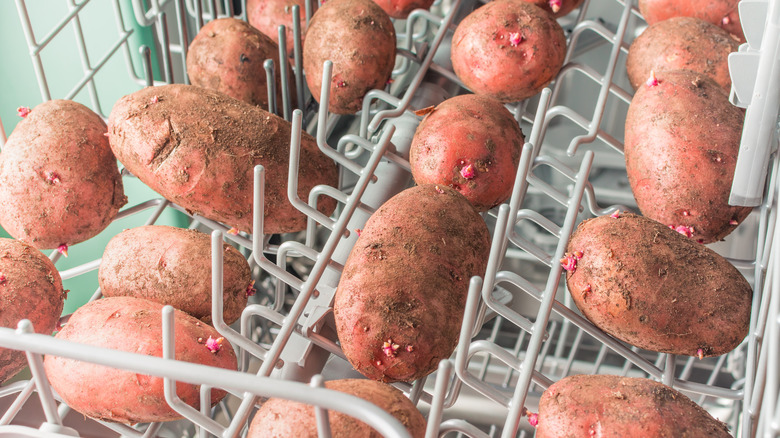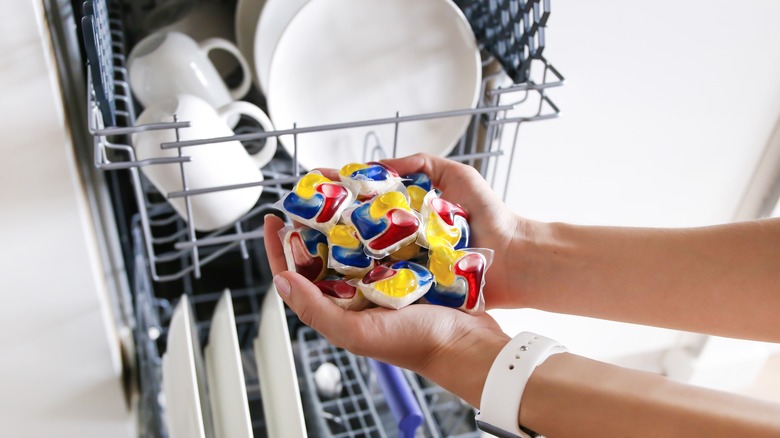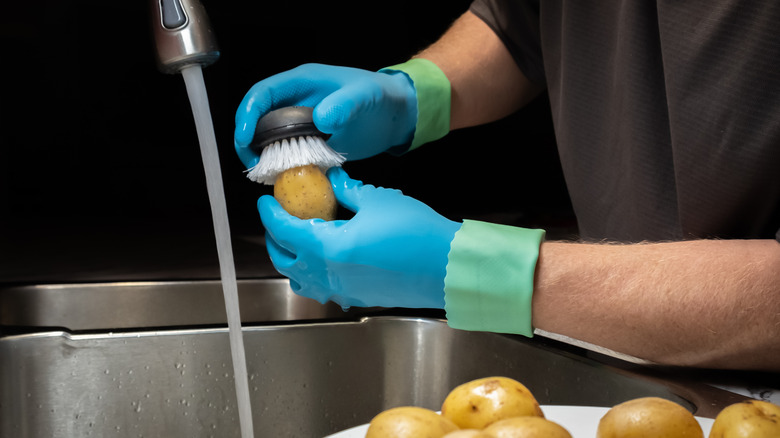Think Twice Before Cleaning Potatoes In The Dishwasher
In the past few years, dishwasher tricks have hit the internet that have nothing to do with cleaning dishes. One trend involves using the appliance to cook food, while another utilizes it to wash produce. From Alton Brown going on "Mythbusters" to see if he could cook a lasagna in one (spoiler alert ... it worked), to the questionable but safe salmon dishwasher hack, people seem awfully determined to use the device in place of an oven. What's more, they apparently want it to replace their kitchen sinks too.
The idea that potatoes can be washed in bulk in the dishwasher has gone viral on TikTok, and it's even been recommended by reputable websites like Masterclass, HGTV, and Delish. The concept is that by using the machine's rinse cycle, you can clean enough potatoes to feed a crowd without having to resort to hand-washing. Simply load them up on the top and bottom racks, set your dishwasher to rinse-only with no soap, and in 10 to 15 minutes, you'll have perfectly clean tubers without having to lift a finger. The steam generated is even supposed to make them easier to peel.
This is meant to be a huge timesaver during the holidays ... or at any other time when you find yourself needing to whip up big batches of mashed potatoes. But this all begs the question — is it really safe? Despite some of the pros suggesting otherwise, the answer is no — and for more reasons than one.
Washing potatoes in the dishwasher is not safe
Though there are ways to run your dishwasher to clean the inside, it can still harbor bacteria. Since potatoes are porous, trying to wash them in there can transfer germs directly onto the vegetables and cause illness. Furthermore, despite proponents of the dishwasher hack suggesting the rinse-only cycle without soap, residual detergent can remain in the machine's system, get absorbed by the permeable potatoes, and make you sick (the USDA does not approve detergent for food usage).
You may be wondering why ingesting soap that may have gotten into potatoes is unsafe while eating off of dishes washed in that same soap is fine. The reason is twofold. For one, your dishes are not porous like potatoes are. They don't absorb bacteria or soap. Secondly, the appliance washes dishes by utilizing heat — the regular wash cycle activates sanitizing ingredients in detergent (including toxic chlorine) by heating it up to 140 degrees Fahrenheit or higher, which kills any bacteria present. The rinse cycle used for cleaning potatoes on the other hand is done with either low-heat or cold settings — no sanitizing takes place. The bottom line is that this method is unsanitary and can expose you to harmful detergents that are not food-safe.
Using your dishwasher for anything other than its intended purpose can damage both it and your plumbing. While the washers are designed to deal with normal food residue, grit from dirty potatoes or even broken-off pieces may cause clogs or blockages.
The best way to clean potatoes
For how to wash potatoes the right way, we again turn to the USDA for guidance. The agency advises that before you eat or even prepare potatoes, they need to be rinsed under cold running water. Since potatoes are grown underground, it's natural for them to come from the grocery store, farmers' market, or your garden with some lingering soil on their surfaces and tucked into their eyes. Cleaning them in water removes surface dirt and helps reduce bacteria. Water is all you need, and both the USDA and FDA note that soaps, detergents, and vegetable washes should be avoided.
You can also use a scrub brush for a more thorough cleaning and to clear out any crevices. If you don't have access to one, you can use a clean dish towel or even paper towels. Another good alternative for how to clean potatoes without a scrubbing brush is to immerse them in cool water to loosen dirt.
It's important to clean your potatoes even if you're planning to peel them, because any germs on the outside can be easily transferred inside by your knife. Once they're washed, cut off any bruised or blemished spots, as these can also hide bacteria, then you can proceed with peeling and prepping. Try using their absorbent nature to your advantage once they're ready to cook — for the best baked potatoes of your life, try a salt water brine before popping them in the oven.



